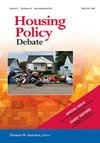复习就是赢,赢,赢
IF 2.9
3区 经济学
Q2 DEVELOPMENT STUDIES
引用次数: 0
摘要
为学术期刊提供建设性的、富有洞察力的同行评审是一项双赢的活动。作者获胜。获得奖学金。评审员获胜。作者之所以获胜,是因为对研究是如何进行和呈现的进行新的、独立的评估只能培养他们的学术能力。尽管回应批评者有时令人不快,但诚实的作者必须承认,这通常会让他们成为更好的分析师和作家,并使他们的论文更强大、更有影响力。奖学金之所以获奖,是因为当更多的人关注研究项目时,研究项目的创造力、分析严谨性、解释清晰性和实用性都会得到增强。同行评审对文章的认可让人相信,所读的是合法的科学,而不是“假新闻”。“评审员获胜是因为这一过程有助于他们了解最新的研究出版物、理论结构、分析方法、定量和定性方法以及实质性发现。评审通过评估手稿的过程磨练了他们的技能,这些手稿可能在逻辑、分析的严谨性、组织和阐述的好处方面差异很大。胜利者的最后一面有被忽视的危险。一些高等教育机构正在向年轻的教师施压,要求他们避免进行同行评审,因为这会干扰他们自己的作品的出版。一个更开明的方法将认识到同行评审是富有成效的学术的一个基本要素。所有学者,尤其是新兴学者,以及声称支持他们的机构,都应该将同行评审视为对作者、学术,当然还有评审者本身特别有益。本文章由计算机程序翻译,如有差异,请以英文原文为准。
To Review is to Win, Win, Win
Providing a constructive, insightful peer review for a scholarly journal is a win–win–win activity. The authors win. The scholarship wins. The reviewers win. The authors win because a fresh, independent assessment of how the research was conducted and presented can only build their scholarly capacities. Although responding to critics is sometimes unpleasant, honest authors must admit that it typically makes them better analysts and writers, and makes their papers stronger and more influential. Scholarship wins because the creativity, analytical rigor, expositional clarity, and practical utility of a research project are enhanced when more minds focus on it. The imprimatur of peer review bestowed on articles imparts confidence that what is being read is legitimate science, not “fake news.” The reviewers win because the process helps them stay current with the latest research publications, theoretical constructs, analytical approaches, quantitative and qualitative methodologies, and substantive findings. Reviewing hones their skills through the process of evaluating manuscripts that may vary widely in their logic, analytical rigor, organization, and exposition benefits. This last dimension of winners is in danger of being overlooked. Some institutions of higher learning are pressuring their younger faculty to avoid performing peer reviews, in the misguided notion that it interferes with publishing their own work. A more enlightened approach would recognize that peer reviewing is an essential element of productive scholarship. All scholars, but especially emerging ones, and the institutions that claim to support them should see peer reviewing as exceptionally beneficial to authors, scholarship, and, yes, the reviewers themselves.
求助全文
通过发布文献求助,成功后即可免费获取论文全文。
去求助
来源期刊

Housing Policy Debate
Multiple-
CiteScore
5.40
自引率
17.20%
发文量
68
期刊介绍:
Housing Policy Debate provides a venue for original research on U.S. housing policy. Subjects include affordable housing policy, fair housing policy, land use regulations influencing housing affordability, metropolitan development trends, and linkages among housing policy and energy, environmental, and transportation policy. Housing Policy Debate is published quarterly. Most issues feature a Forum section and an Articles section. The Forum, which highlights a current debate, features a central article and responding comments that represent a range of perspectives. All articles in the Forum and Articles sections undergo a double-blind peer review process.
 求助内容:
求助内容: 应助结果提醒方式:
应助结果提醒方式:


